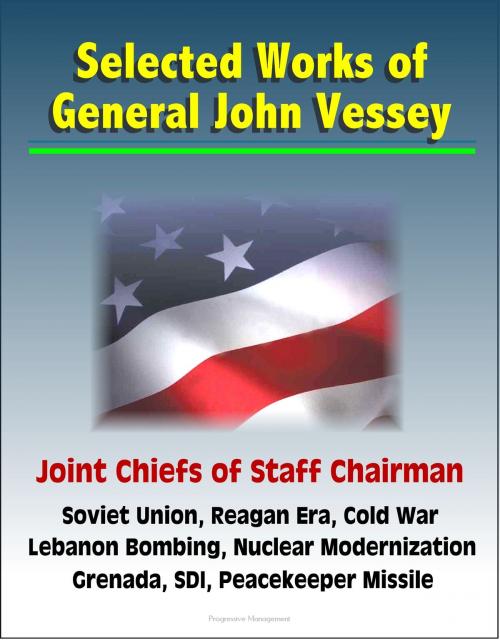Selected Works of General John Vessey, Joint Chiefs of Staff Chairman, Soviet Union, Reagan Era, Cold War, Lebanon Bombing, Nuclear Modernization, Grenada, SDI, Peacekeeper Missile
Nonfiction, History, Military, Nuclear Warfare, United States| Author: | Progressive Management | ISBN: | 9781301403332 |
| Publisher: | Progressive Management | Publication: | September 14, 2013 |
| Imprint: | Smashwords Edition | Language: | English |
| Author: | Progressive Management |
| ISBN: | 9781301403332 |
| Publisher: | Progressive Management |
| Publication: | September 14, 2013 |
| Imprint: | Smashwords Edition |
| Language: | English |
This book presents material drawn from the public record of General John W. Vessey's service—22 June 1982 through 30 September 1985—as the Tenth Chairman of the Joint Chiefs of Staff. Arranged in chronological order, the material is drawn from his speeches, Congressional testimony, published articles, selected correspondence and interviews. It reflects General Vessey's work to rebuild and upgrade the armed forces of the United States. Of particular interest are his efforts to improve the quality of the Joint Staff and his emphasis upon the importance of the unified and specified commands which foreshadowed important provisions of the Goldwater-Nichols Department of Defense Reorganization Act of 1986.
On 18 June 1982 Vessey became the tenth Chairman of the Joint Chiefs of Staff and the last World War II combat veteran to serve in the position. During his tenure there was increased emphasis on decentralization. Secretary of Defense Caspar Weinberger authorized General Vessey to direct military operations on the Secretary's behalf. He oversaw execution of the operation that rescued US citizens and brought a pro-US government into power. There was also an increased emphasis on space as a theater of operations. In early 1983 the Joint Chiefs mentioned to President Reagan that defense against nuclear missiles might be technically feasible in the next century and on 23 March 1983 he announced his vision of the Strategic Defense Initiative (SDI). Realizing the enormous military advantages to be gained from operations in space and to support SDI, the JCS recommended the establishment of a unified command for space. US Space Command was activated on 23 September 1985. General Vessey retired on 30 September 1985 at the age of 63, several months before the expiration of his second term as Chairman. He was the last four-star World War II combat veteran on active duty and, with 46 years of service, had served the longest of anyone then in the Army. General Vessey was the only Chairman who had been neither a Service Chief nor commander of a unified or specified command.
This book presents material drawn from the public record of General John W. Vessey's service—22 June 1982 through 30 September 1985—as the Tenth Chairman of the Joint Chiefs of Staff. Arranged in chronological order, the material is drawn from his speeches, Congressional testimony, published articles, selected correspondence and interviews. It reflects General Vessey's work to rebuild and upgrade the armed forces of the United States. Of particular interest are his efforts to improve the quality of the Joint Staff and his emphasis upon the importance of the unified and specified commands which foreshadowed important provisions of the Goldwater-Nichols Department of Defense Reorganization Act of 1986.
On 18 June 1982 Vessey became the tenth Chairman of the Joint Chiefs of Staff and the last World War II combat veteran to serve in the position. During his tenure there was increased emphasis on decentralization. Secretary of Defense Caspar Weinberger authorized General Vessey to direct military operations on the Secretary's behalf. He oversaw execution of the operation that rescued US citizens and brought a pro-US government into power. There was also an increased emphasis on space as a theater of operations. In early 1983 the Joint Chiefs mentioned to President Reagan that defense against nuclear missiles might be technically feasible in the next century and on 23 March 1983 he announced his vision of the Strategic Defense Initiative (SDI). Realizing the enormous military advantages to be gained from operations in space and to support SDI, the JCS recommended the establishment of a unified command for space. US Space Command was activated on 23 September 1985. General Vessey retired on 30 September 1985 at the age of 63, several months before the expiration of his second term as Chairman. He was the last four-star World War II combat veteran on active duty and, with 46 years of service, had served the longest of anyone then in the Army. General Vessey was the only Chairman who had been neither a Service Chief nor commander of a unified or specified command.















